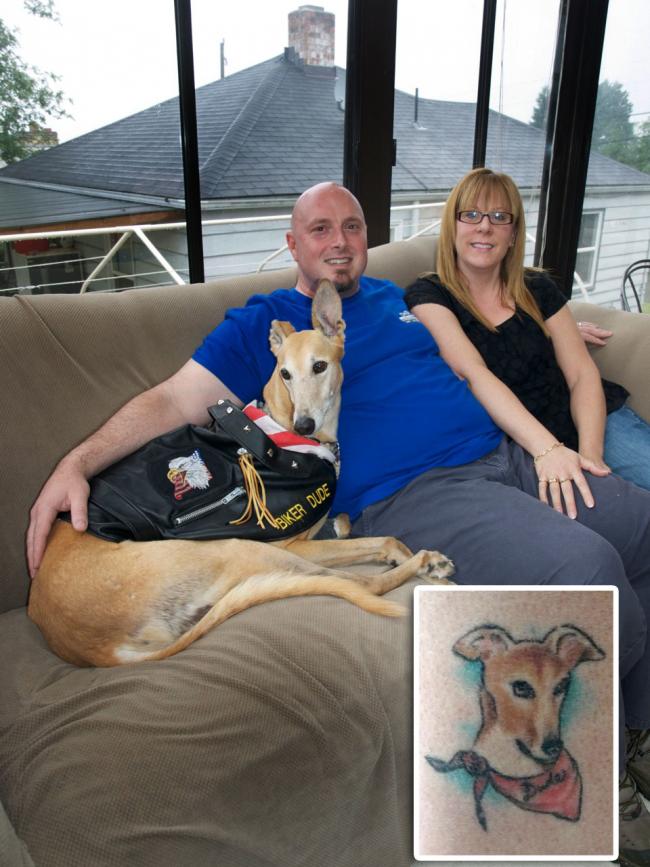Pet of the week: Twister is a dude with a mellow attitude
The Whitteds call their dog "Dude" around the house though his name is Twister. He has truly become a deeply loved member of the family. So much so that Kim even got a tattoo on her ankle to honor the dog.
Tue, 06/08/2010
There are a number of Greyhound rescue groups in Seattle. and Pat and Kim Whitted found their dog Twister at one of them. When they first got him he was in bad shape. "He'd broken his ankle on the track, which is why he stopped racing," said Pat, "He raced for 13 months."
Twister's bone break had not been set well by whoever took care of him so the the adoption group put him up in Idaho, where they re-set his leg, neutered him but he had one testicle that had not descended so they had to cut him up pretty hard to get it out. He also had lost part of his hair. "They keep these dogs in cages for 23 hours a day so his butt was bald when we got him so his hair looked like a bad perm," said Kim.
"He raced 119 races, came in first 20 times, second 20 times," Pat said. According to the Whitted's there is a database online where information about greyhounds can be seen. Each dog is given a unique tattoo on their ear. "You can put the tattoo number in on the website and it will pull up the full race record and the dog's lineage," said Pat. "It goes back to 1795," said Kim.
Twister (whose racing name was SciFi Twister) raced in the midwest a few years ago but the sport, which is highly controversial, has been in decline since the 1960's. Today it's still taking place in Alabama, Arizona, Arkansas, Connecticut, Florida, Guam, Iowa, New Hampshire, Rhode Island, Texas, and West Virginia and in many countries around the world. According to the Wikipedia entry on the subject "In the United States, prior to the formation of adoption groups, over 20,000 retired greyhounds a year were euthanized; recent estimates still number in the thousands, with about 90% of National Greyhound Association-registered animals either being adopted, or returned for breeding purposes (according to the industry numbers upwards of 2000 dogs are still euthanized annually in the US while anti-racing groups estimating the figure at closer to 12,000.)"
Twister has allergies so all his food is cooked and specially prepared. "We make sure that he gets tons of vitamins and we keep him a little overweight because if he has an allergic reaction he can drop weight 'like that'," Kim said. He's allergic to grasses, and typical people allergies.
Around the house, "He's a big cat," said Kim. Pat said, "One of the beauties about him, when he's healthy is that he's 'self-exercising' we put him out in the yard and you'll see him zip past a few times and then he's done, ready to come back in and have another nap."
"Two things he really loves, he loves going for a walk and he loves it when 'Grammy' comes over. He just jumps straight up in the air, all four feet off the ground," Pat said when his grandmother visits. Most of the time, Twister is just "so sweet", said Kim. He's an athlete who rests a lot, napping much of the time. But he can still run.
One day, they almost lost him. "We went up to Rattlesnake Lake," explained Pat, " to an off leash park near there. We had Twister off leash and he took off up the trail." Kim continued, "He was gone for 45 minutes, and I went up a mountain to find him, and there was snow. The book says never, ever, ever take them off leash because they will see something and take off. You'll never see them again because they have no sense of direction. Their focus is whatever they're chasing. He came back, he followed a jogger back."
How to nominate your pet for Pet of the Week:
Want to nominate your pet for Pet of the Week? Stop by the VCA West Seattle Veterinary Hospital at 5261 California Ave. S.W. and just ask for a form. A nomination is not a guarantee of appearance and your name and photo may appear in our newspaper and online.
Photos may or may not be used and our "Pet Reporter" may be in touch with you to arrange to take a photo. Pets nominated will be chosen on the basis of uniqueness of the pet and the quality of the story and information submitted.


